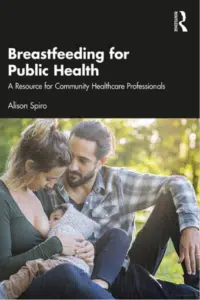5th August 2022
During World Breastfeeding Week 2022 (1-7 August), we are delighted to share this Voices blog by Dr Tanya Dennis, Health Visitor, as she reviews a book written by Dr Alison Spiro – Breastfeeding for Public Health: a resource for community healthcare professionals. Routledge, 2022.

Dr Tanya Dennis HV
‘Breastfeeding for Public Health’ has been written by a specialist health visitor and infant feeding Lead with many years of practical experience in the field in both community and hospital settings. Dr Spiro did a doctorate in Social Anthropology looking at breastfeeding practices in Indian families in London and India. Since retirement from the NHS, she has become an Honorary Lecturer at Brunel University, a professional advisor for Best Beginnings and previously for the Institute of Health Visiting, and also volunteers in breastfeeding support groups. She worked on the UK World Breastfeeding Trends initiative (WBTi) and the Becoming Breastfeeding Friendly (BBF) reports and recommendations.

Dr Alison Spiro
Breastfeeding is an important public health priority. Supporting families to breastfeed, and increasing the number of babies who are breastfed, offers them the best possible start in life. Health visitors have an important role in supporting mothers to enable them to continue breastfeeding, which is important not only for the mother’s and child’s welfare, but for the overall good of society. Health visitors have long advocated for interventions supporting mothers in breastfeeding. It is essential that they use the best up-to-date evidence, together with their clinical knowledge and patient’s beliefs, to formulate their care plans. This book addresses multifaceted aspects of breastfeeding; both psychological and physiological issues from a cultural and public health perspective.
This book is both interesting and informative, giving in-depth guides and accounts of breastfeeding including recent research and information on practical skills needed by health visitors to support mothers with breastfeeding. It covers important areas of practice such as: why does breastfeeding matter; how to develop trusting relationships with women and their families; overcoming breastfeeding challenges; cultural influences; health and psychological attachment; the effect on infants; the health benefits; as well as the role that extended family members play in successfully initiating and promoting breastfeeding practice. Drawing on epidemiological and biological studies, the author argues that the decision to not breastfeed a child has major long-term effects on the health and development of the child and on the woman’s health. The text aims to enable health visitors and community practitioners to enhance their skills in supporting mothers and their families who choose to breastfeed. Whilst the book is written primarily for health visitors and community practitioners, it is a good resource for all settings: hospitals, clinics, medical practices, and peer support. The information in this text can be used to promote good breastfeeding practices.
Dr Spiro discusses the obstacles and challenges facing mothers and professionals, and argues that the challenges to health professionals lies with promoting an oxytocin-friendly environment, understanding breastfeeding releasing mechanisms, and learning how best to intervene and support families. Showcasing all kinds of practical tips dealing with problems, relevant research, and real-life experiences, with helpful photos and illustrations and images, this book is a realistic and helpful guide to professionals. Filled with a range of research evidence and helpful advice, many topics are linked to an anthropological perspective, to research evidence, and to cultural sensitivity, as well as practical examples from her practice. She extends the analysis of the importance of breastfeeding to mental health and the mother-child relationship.
We have in this book a voyage of discovery. The first four chapters look at why breastfeeding in the UK is still difficult; the normalisation of formula feeding; the importance of breastfeeding for health; and how health practitioner can influence the current practice by embedding practical skills as well as research into their practice. She argued that we need to recreate the environment so women can meet and support each other more easily, ‘such as breastfeeding support groups’. Chapter two highlights why breastfeeding is important and links research findings to epigenetics. The historical perspectives of infant feeding in the UK and social inequalities are examined and Dr Spiro makes some suggestions as to how professionals can influence societal changes. She argues that moral considerations should be present in professional practice and she advocates for a culturally sensitive approach to clients’ needs. She pursues the conflict between the advertising of formula milk for babies and the wider social factors that influence parental decisions regarding feeding.
Chapter 5, here as elsewhere, Dr Spiro discusses the material that skilled health professionals need to support parents. The second part of the book from chapter 5 consists of a series of analyses gathered from her practice. These give substance to her suggestions that health visitors pay a major role in supporting parents and families in breastfeeding. Some of the challenges are examined using illustrations.
This is not really a book about politics, though political experiences obviously do come into it. Chapter 10 gives us an anthropological insight into the way societies view breastfeeding – discussing Bourdieu’s idea of habitus and Nancy Scheper Hughes and Margaret Lock’s mindful lived body to try to understand the interaction between the individual body, the social body and the body politic and the lived experiences of the breastfeeding mothers. By examining the phenomenology of these experiences, the way they are narrated and the rituals employed, Dr Spiro reconstructs the world of breastfeeding. She draws upon the idea that breastfeeding is inherently socially conducted through narrative practices in which mothers, their families and other agencies all participate. Introducing the concept, she invites the professionals to think about the best possible outcomes for their clients, taking into consideration individual cultural needs.
This resource will not sit on the shelf! Dr Spiro combines medically-backed research and the real-life experience of her patients and this is a strength of the text.
I recommend the book to Health Visitors because it’s educational, informative, interesting and helpful to experienced health professionals as well as students. It will equip them with knowledge and skills, increase professionals’ understanding of breastfeeding, and help them to overcome common challenges and thus better support the families. Breastfeeding for Public Health provides a theoretical and practical understanding of the subject. The evidence-based insights are helpful for any professional or parent as they navigate the challenges of breastfeeding.
Dr Tanya Dennis, Health Visitor,
About the book
Breastfeeding for Public Health: A Resource for Community Healthcare Professionals Routledge, 2022. Author: Dr Alison Spiro can be bought from Amazon or Waterstones


